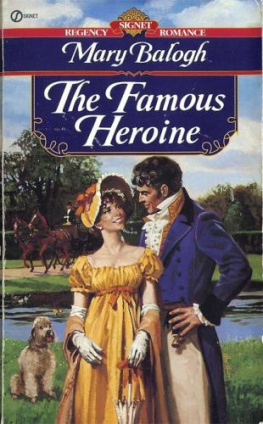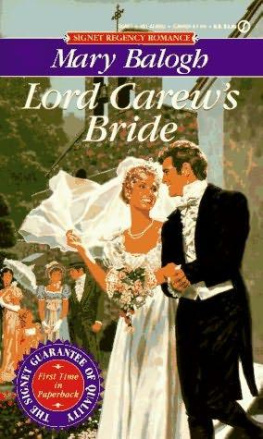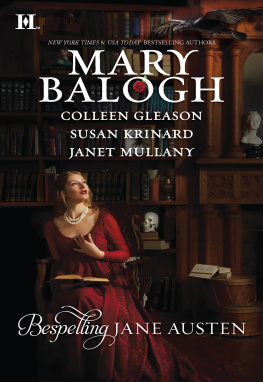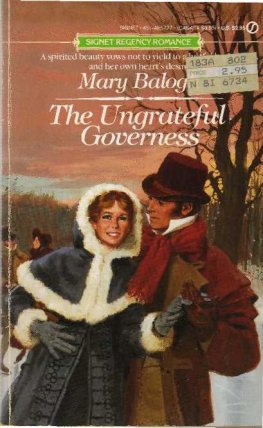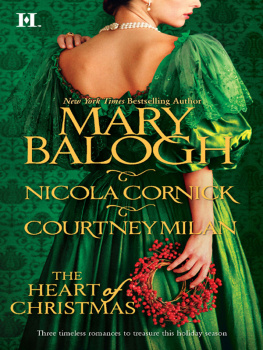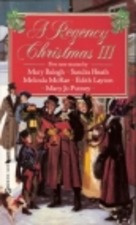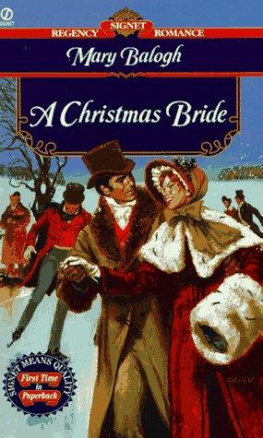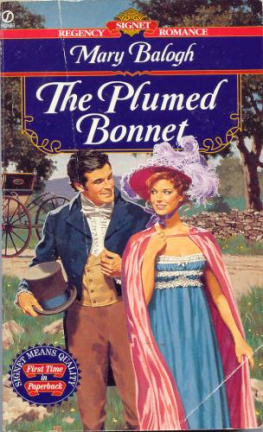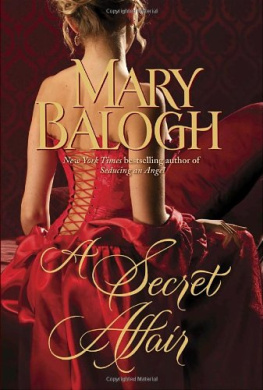Mary Balogh - Simply Unforgettable
Here you can read online Mary Balogh - Simply Unforgettable full text of the book (entire story) in english for free. Download pdf and epub, get meaning, cover and reviews about this ebook. year: 2005, publisher: Delacorte Press, genre: Prose. Description of the work, (preface) as well as reviews are available. Best literature library LitArk.com created for fans of good reading and offers a wide selection of genres:
Romance novel
Science fiction
Adventure
Detective
Science
History
Home and family
Prose
Art
Politics
Computer
Non-fiction
Religion
Business
Children
Humor
Choose a favorite category and find really read worthwhile books. Enjoy immersion in the world of imagination, feel the emotions of the characters or learn something new for yourself, make an fascinating discovery.

- Book:Simply Unforgettable
- Author:
- Publisher:Delacorte Press
- Genre:
- Year:2005
- Rating:5 / 5
- Favourites:Add to favourites
- Your mark:
- 100
- 1
- 2
- 3
- 4
- 5
Simply Unforgettable: summary, description and annotation
We offer to read an annotation, description, summary or preface (depends on what the author of the book "Simply Unforgettable" wrote himself). If you haven't found the necessary information about the book — write in the comments, we will try to find it.
Simply Unforgettable — read online for free the complete book (whole text) full work
Below is the text of the book, divided by pages. System saving the place of the last page read, allows you to conveniently read the book "Simply Unforgettable" online for free, without having to search again every time where you left off. Put a bookmark, and you can go to the page where you finished reading at any time.
Font size:
Interval:
Bookmark:

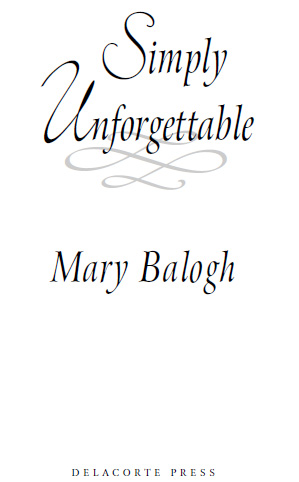
Contents
1

It never snowed for Christmas. It always snowedif it snowed at allbefore Christmas, when people were trying to travel to family gatherings or house parties, or long after Christmas, when it was a mere nuisance to people trying to go about the business of their everyday lives. It never snowed actually on Christmas, when it would have added a picturesque quality and some magic to the celebrations.
Such was the sad reality of living in England.
This year had been no exception. The skies had remained stubbornly gray and heavy with the promise of something dire all over the holiday, and the weather had been chilly and blustery and really not very pleasant at all. But the ground had remained obstinately bare and as drab as the sky.
It had been a rather dreary Christmas, if the truth were told.
Frances Allard, who had made the long days journey from Bath, where she taught at Miss Martins School for Girls on Sutton and Daniel streets, in order to spend the holiday with her two great-aunts near the village of Mickledean in Somersetshire, had looked forward to being in rural surroundings. She had dreamed of taking long walks in the crisp winter countryside, blue skies overhead, or else of wading to church and the Assembly Rooms through a soft white fall of snow.
But the wind and the cold devoid of sunshine had forced her to curtail the few walks she had undertaken, and the Assembly Rooms had remained firmly closed, everyone having been content, it seemed, to spend Christmas with family and friends this year rather than with all their neighbors at a communal party or ball.
Frances would have been lying to herself if she had not admitted to feeling just a little disappointment.
Miss Gertrude Driscoll and her widowed sister, Mrs. Martha Melford, Francess great-aunts, who lived at the dower house in the park of Wimford Grange, had been invited to join Baron Cliftons family at the big house on Christmas Day, the baron being their great-nephew and therefore a cousin of some remove to Frances. Frances had been invited too, of course. They had also all been invited to a few other private parties in the neighborhood. But the great-aunts had sent back polite refusals to them all, declaring themselves too cozy in their own house to venture outdoors in such inclement weather and too contented with the coveted company of their great-niece to bother with any invitations. They could, after all, visit their great-nephew and his family and their neighbors any day of the year. Besides, Great-Aunt Gertrude had fancied that she was coming down with something, though she had displayed no clearly discernible symptoms, and dared not stray too far from the fireside of her own home.
Francess wishes had not been consulted.
Only when the holiday was over and they were hugging her and shedding a few tears over her and kissing her good-bye before she stepped up into their rather rickety private carriage, which they had insisted upon sending with her though it did not usually venture beyond a five-mile radius around the village, did it occur to her great-aunts that maybe they had been selfish in remaining at home all over the holiday and ought to have remembered that dear Frances was only three-and-twenty and would perhaps have enjoyed a party or two and the company of other young people to enliven the tedium of a Christmas spent entirely with two old ladies.
She had hugged them in return and shed a few tears of her own and assured themalmost truthfullythat they were all she had needed to make Christmas a wondrously happy occasion after a long term at school, though actually it had been more than one term. She had remained at the school all through last summer, since Miss Martin took in charity girls and it was always necessary to provide for their care and entertainment through the various holidaysand Frances had had nowhere particular to go at the time.
Christmas had, then, been a disappointingly dull holiday. But she really had enjoyed the quiet after the constantly busy bustle of school life. And she was extremely fond of her great-aunts, who had opened their arms and their hearts to her from the moment of her arrival in England as a motherless baby with a French migr father who had been fleeing the Reign of Terror. She had no memory of that time, of course, but she knew that the aunts would have brought her into the country to live with them if Papa had chosen to let her go. But he had not. He had kept her with him in London, surrounding her with nurses and governesses and singing masters, and lavishing upon her all that money could buy for her comfort and pleasureand oceans of love besides. She had had a happy, privileged, secure childhood and girlhooduntil her fathers sudden death when she was only eighteen.
But her aunts had had some role to play in her growing years. They had brought her into the country for holidays and had occasionally gone to London to take her about and buy her gifts and feed her ices and other treats. And ever since she had learned to read and write she had exchanged monthly letters with them. She was inordinately fond of them. It really had been lovely to spend Christmas in their company.
There had been no snow to enliven her Christmas, then.
There was snow, howeverand plenty of itsoon after.
It began when the carriage was no more than eight or ten miles from Mickledean, and Frances did consider knocking on the roof panel and suggesting to the elderly coachman that they turn around and go back. But it was not a heavy snow, and she did not really want to delay her journey. It looked more like a white rain for all of the hour after it began. But inevitablywhen it really was too late to turn backthe flakes became larger and thicker, and in an alarmingly short time the countryside, which had been looking as if it were rimed with heavy frost rather than with snow itself, began to disappear under a thickening blanket of white.
The carriage moved steadily onward, and Frances assured herself that it was foolish to be nervous, that the road was probably perfectly safe for travel, especially at the plodding speed to which Thomas was keeping the horses. Soon the snow would stop falling and begin to melt, as was always the way with snow in England.
She concentrated her thoughts on the term ahead, planning which pieces of music she would choose for the senior madrigal choir to sing. Something bright and brilliant and Elizabethan, she thought. She wondered if she dared choose something in five parts. The girls had mastered three-part singing and were doing rather well at four-part pieces, though they did sometimes break off in the middle of a phrase to collapse in laughter as they got hopelessly entangled in complex harmonies.
Frances smiled at the thought. She usually laughed with them. It was betterand ultimately more productivethan weeping.
Maybe they would try five parts.
Within another half hour, it was no longer possible to see anything but unrelieved white in any directionand no longer possible to concentrate upon thoughts of school or anything else. And the snow was still falling so thickly that it dazzled the eyes and made it hard to see any great distance from the windows even if there had been anything to see. When she pressed the side of her face against the glass in order to look ahead, she could not even distinguish the road from the ditches or the fields beyond. And there did not even seem to be any hedgerows on this particular stretch that might have provided some sort of dark border to signify where the road was.
Next pageFont size:
Interval:
Bookmark:
Similar books «Simply Unforgettable»
Look at similar books to Simply Unforgettable. We have selected literature similar in name and meaning in the hope of providing readers with more options to find new, interesting, not yet read works.
Discussion, reviews of the book Simply Unforgettable and just readers' own opinions. Leave your comments, write what you think about the work, its meaning or the main characters. Specify what exactly you liked and what you didn't like, and why you think so.



